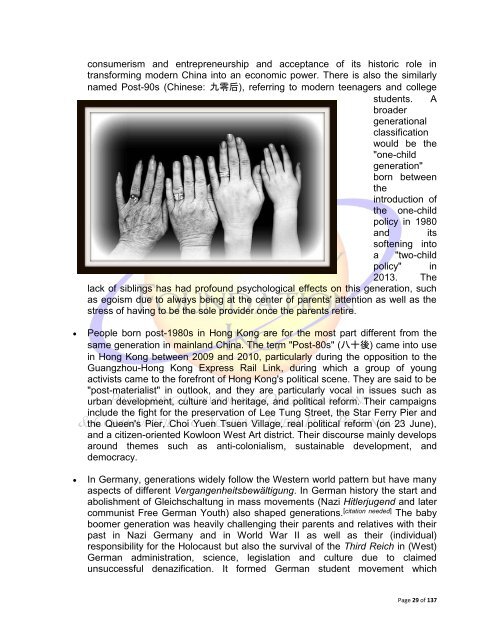Generational Progression
Generational Progression
Generational Progression
Create successful ePaper yourself
Turn your PDF publications into a flip-book with our unique Google optimized e-Paper software.
consumerism and entrepreneurship and acceptance of its historic role in<br />
transforming modern China into an economic power. There is also the similarly<br />
named Post-90s (Chinese: 九 零 后 ), referring to modern teenagers and college<br />
students. A<br />
broader<br />
generational<br />
classification<br />
would be the<br />
"one-child<br />
generation"<br />
born between<br />
the<br />
introduction of<br />
the one-child<br />
policy in 1980<br />
and its<br />
softening into<br />
a "two-child<br />
policy" in<br />
2013. The<br />
lack of siblings has had profound psychological effects on this generation, such<br />
as egoism due to always being at the center of parents' attention as well as the<br />
stress of having to be the sole provider once the parents retire.<br />
<br />
<br />
People born post-1980s in Hong Kong are for the most part different from the<br />
same generation in mainland China. The term "Post-80s" ( 八 十 後 ) came into use<br />
in Hong Kong between 2009 and 2010, particularly during the opposition to the<br />
Guangzhou-Hong Kong Express Rail Link, during which a group of young<br />
activists came to the forefront of Hong Kong's political scene. They are said to be<br />
"post-materialist" in outlook, and they are particularly vocal in issues such as<br />
urban development, culture and heritage, and political reform. Their campaigns<br />
include the fight for the preservation of Lee Tung Street, the Star Ferry Pier and<br />
the Queen's Pier, Choi Yuen Tsuen Village, real political reform (on 23 June),<br />
and a citizen-oriented Kowloon West Art district. Their discourse mainly develops<br />
around themes such as anti-colonialism, sustainable development, and<br />
democracy.<br />
In Germany, generations widely follow the Western world pattern but have many<br />
aspects of different Vergangenheitsbewältigung. In German history the start and<br />
abolishment of Gleichschaltung in mass movements (Nazi Hitlerjugend and later<br />
communist Free German Youth) also shaped generations. [citation needed] The baby<br />
boomer generation was heavily challenging their parents and relatives with their<br />
past in Nazi Germany and in World War II as well as their (individual)<br />
responsibility for the Holocaust but also the survival of the Third Reich in (West)<br />
German administration, science, legislation and culture due to claimed<br />
unsuccessful denazification. It formed German student movement which<br />
Page 29 of 137

















